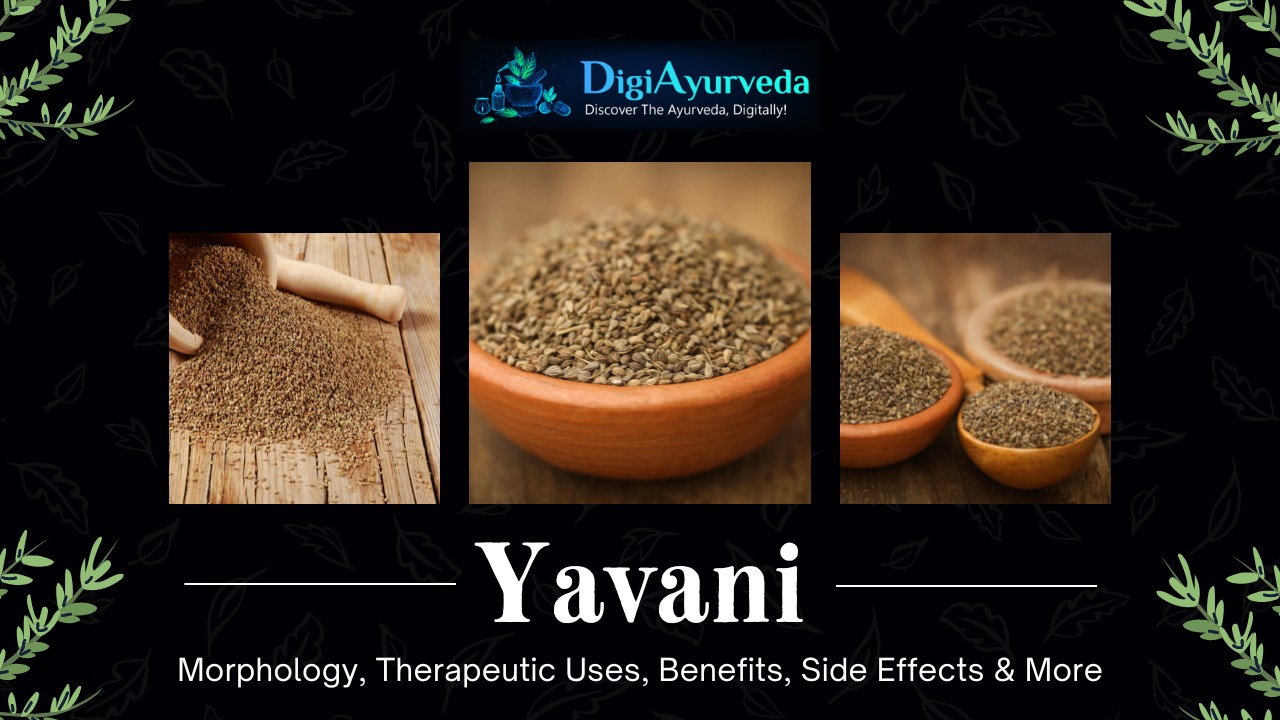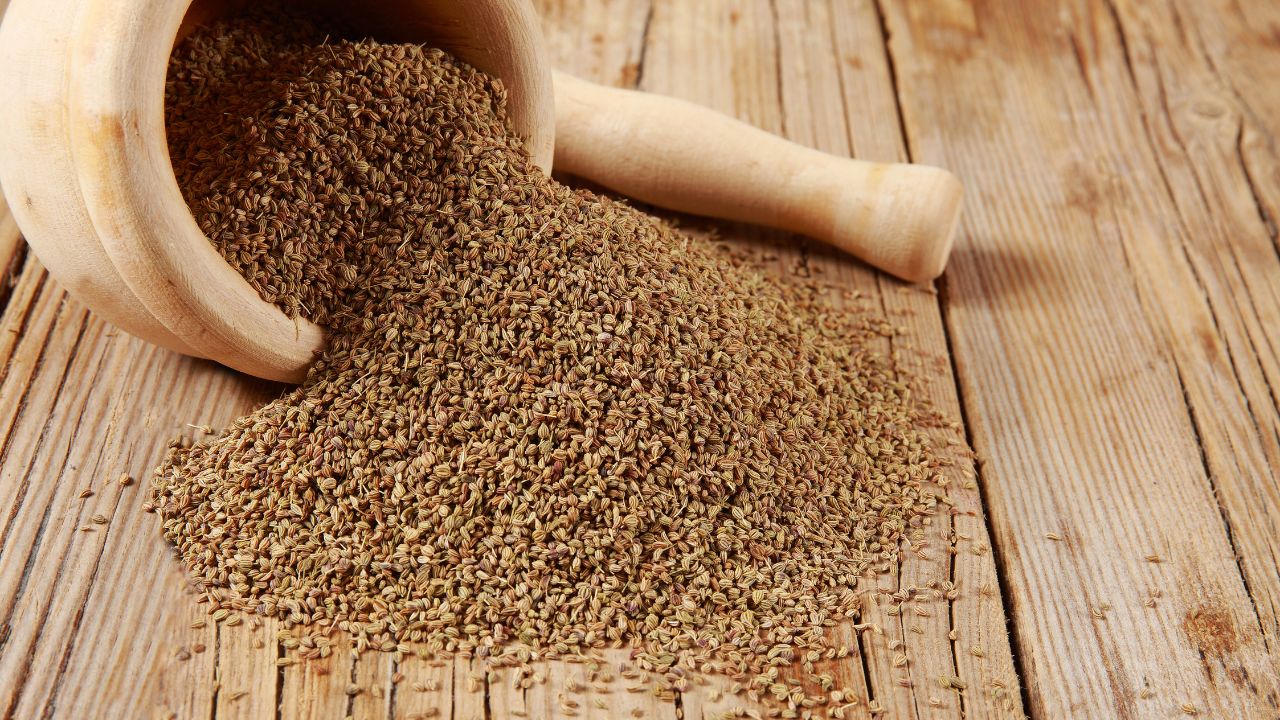
Family: umbelliferae
Biological classification
- Kingdom: Plantae
- Subkingdom: Tracheobionta
- Superdivision: Spermatophyta
- Division: Magnoliophyta
- Class: Magnoliopsida
- Order: Apiales
- Family: Apiaceae
- Genus: Trachyspermum
- Species: ammi
Introduction To Yavani
Ajwain is small, oval-shaped, seed-like fruits are pale brown schizocarps, which resemble the seeds of other plants in the family Apiaceae such as caraway, cumin and fennel. They have a bitter and pungent taste, with a flavor similar to anise and oregano. They smell almost exactly like thyme because they also contain thymol, but they are more aromatic and less subtle in taste, as well as being somewhat bitter and pungent. Even a small number of fruits tends to dominate the flavor of a dish.
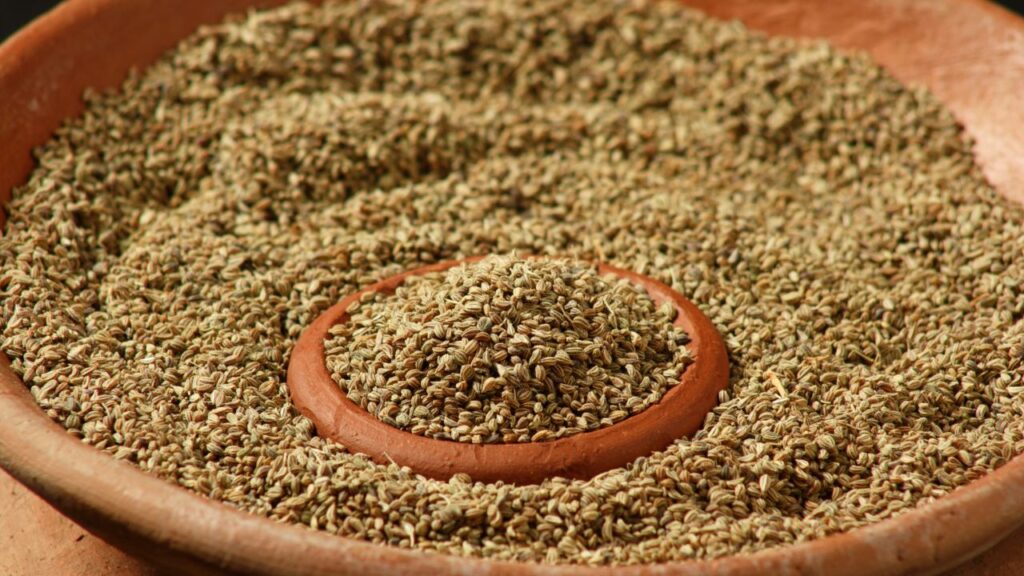
Habitat / place of origin
Trachyspermum ammi is a native of Egypt and is cultivated in Iraq, Iran, Afghanistan, Pakistan, and India. In India, it is cultivated in Madhya Pradesh, Uttar Pradesh, Gujarat, Rajasthan, Maharashtra, Bihar and West Bengal.
Synonyms of Yavani
Sanskrit : Yavani , Ajmmodika , Deepyaka (Deepan), Yamani, Yamanika, Yavanika
Assamese: Jain
Bengali: Jowan , Yamani, Yauvan, Yavan, Javan, Yavani, Yoyana
English: Ajowan , Bishop’s Weed
Gujarati: Ajmo, Ajma, , Yavan, Javain
Hindi: Ajvayin
Kannada: Oma
Kashmiri: Jawind
Malyalam: Omam, Ayanodakan
Marathi: Ova
Oriya: Juani
Punjabi: Lodhar
Tamil : Vamu
Telugu : Aamam
Morphology of Yavani
It is widely grown in arid and semi-arid regions profusely branched annual herb, 60-90 cm tall.
Stem : Stem is striated
Leaves Leaves pinnate, with a terminal and 7 pairs of lateral leaflets.
Flower: Inflorescence compound umbel , 16 umbellets, flowers actinomorphic, white, male and bisexual;
Corolla 5, Petals bilobed; Stamens 5, alternating with the petals; Ovary inferior; Stigma knob-like;, cremocarp with a persistent stylopodium
Fruit : Fruits have a specific aroma , ovoid shape, cordate Fruit, It is consists of two mericarps, gray brown in colour, elliptical, compressed, about 2 mm long and 1.7mm wide, 5 crests and 6 vittae in each mericarp, generally separate, 5 primary crests.
Flowering time: February- April
Fruiting time : After flowering
Medicinal Parts of Yavani
Fruit
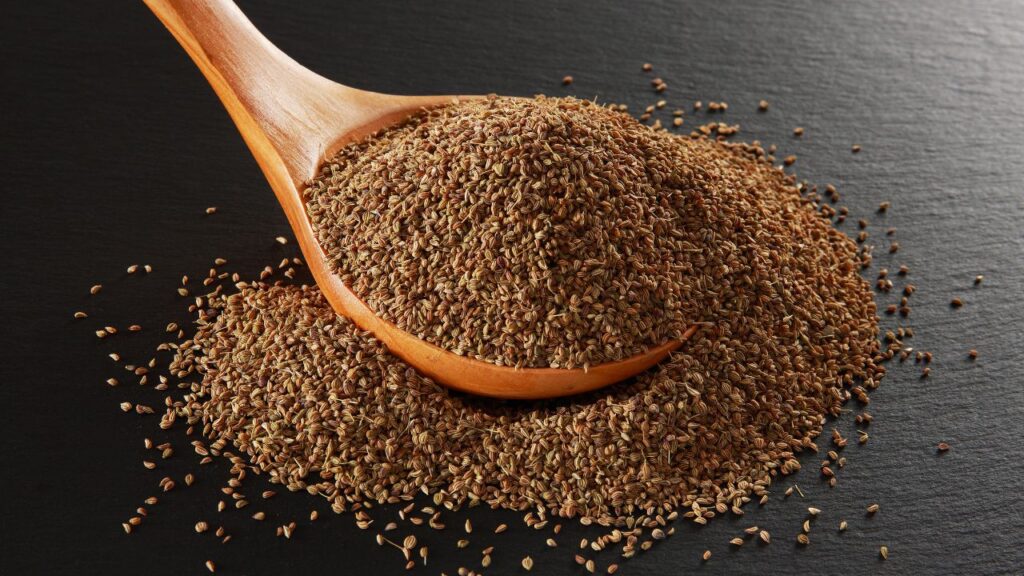
Plant variety of Yavani
It has many variety like
- Badi ajwain
- Choti ajwain
- Ndiyad ajwain
Chemical Composition of Yavani
|
Seeds |
Fibers= 11.9% Carbohydrates =38.6% Tannins Glycosides Moisture (8.9%) Protein (15.4%), Fat (18.1%), Saponins, Flavone Mineral Matter (7.1%) Containing Calcium, Phosphorous, Iron And Nicotinic Acid.
|
|
Fruits |
2% To 4% Brownish Essential Oil, With Thymol As The Major Constituent (35% To 60%). Para-Cymene, Γ-Terpenine, Α- And Β-Pinenes, Dipentene, Α-Terpinene, And Carvacrol 6-O-Β-Glucopyranosyloxythymol Glucoside 25% Oleoresin Containing 12% Volatile Oil |
|
Others |
Camphene, Myrcene, And Α-3-Carene Alcoholic Extracts
|
|
Principal Oils |
Carvone (46%), Limonene (38%), Dillapiole (9%)
|
Ayurvedic Properties of Yavani
Rasa (Taste) : Katu , Tikta
Guna (Quality) : Laghu , Ruksha , Tikshan
Virya (Potency) : Ushna
Vipak (Post Digestive Effect): Katu
Karma (Pharmacological Actions) of Yavani
Dosha Karma : Kaph-Vata Shamak
Sansthanik Karma (General Indication ): Vednasathapan , Shothhar , Anuloman , Jantughan , Vishghan
Pachan Sansthan (Digestive System ): Rochak , Deepan , Vatanuloman , Shoolparshaman , Krimighan
Raktvahsansthan (Cvs): Haridyautejak
Sawsanvah Sansthan (Respiratory System ): Kaphaghan , Sleshamputihar, Sawashar
Mutravahsansthan (Urinary System ): Mutrajanana
Prajanana Sansthan (Reproductive System ): Shukranashan , Satnaynasan , Garbhashaya Uttejak
Tavcha (Skin): Swedjanan , Tavkdoshahar
Tapkarma (Thermoregulation): Shittparshaman , Jawarghan
Vishghan
Qualities/Effects on Tridosha of Yavani
It reduces vata-kapha by Tikshan -ushna and increases the pitta dosha.
Formulations of Yavani
- Yawanikaadi kawath
- Yawanikadi churna
- Yawanyark
- Yavani Sadava
- Optha care (eye drop)
Therapeutic Uses of Yavani
- It is indicated in kapha and vata diseases .
- Indicated in pain
- Indicated in digestive system , digestive stimulant, gastroprotective
- Indicated in worm infestation ,Antimicrobial, anthelmintic, amoebiasis,
- Indicated in heart disorders, Antihypertensive , Hypolipidemic
- Indicated chronic cough . And cold , asthma. Bronchodilating
- Indicated in puerperal disorders , dysmenorrhea, amenorrhoea, abortifacient,
- Indicated in skin disorders
- Indicated as antipyretic, febrifugal and in the treatment of typhoid fever
- Indicated in poisoning
- Indicated colic pains;
- Hepatoprotective
- Antispasmodic, antiseptic
- Anti lithiasis,
- Diuretic , detoxification of aflatoxins,
- Galactagogue,
- Antiplatelet-aggregatory,
- Anti inflammatory,
- Antitussive, antifilarial
- Nematicidal
- Ameliorative effects.
- Expectorant,
Dosage of Yavani
- Powder=1-3gm
- Oil=1-3 drops
- Satav = 30-120mg
- Ark=20-40ml
How can you consume Yavani
It is administered as in the form of oils , paste and also in the form of extract of yavani . It is also used as powdered form . It is an important part of many formulations.
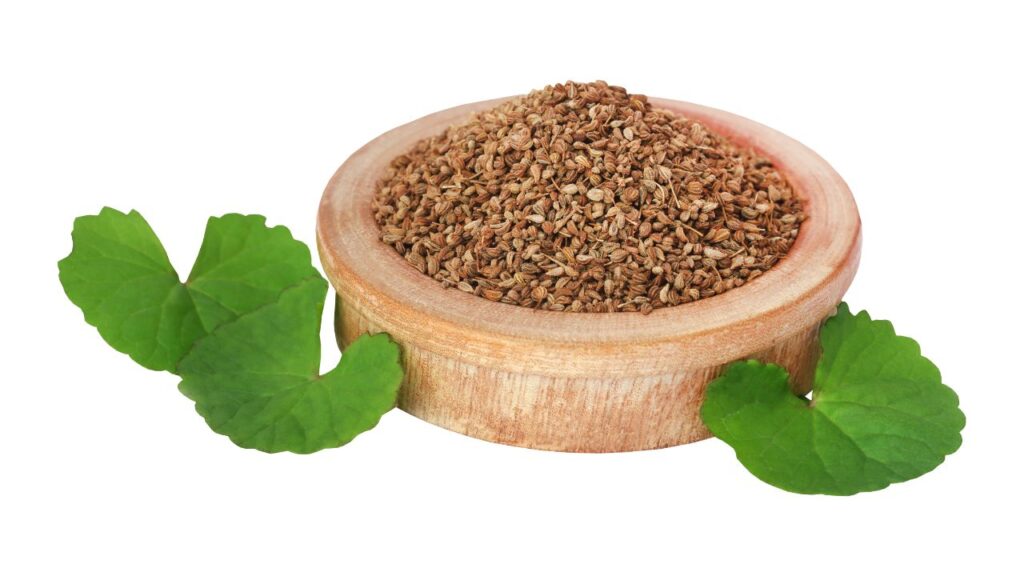
Benefits of Yavani
- It used in kidney stones,
- It is Used in hypertension
- It Normalize the high serum levels of liver enzymes caused by ccl4-induced liver damage
- It inhibits aggregation of platelets induced by collagen,arachidonic acid, and epinephrine.
- It helps in execration of intestinal parasites which
- It is effective in hookworm infestation.
- It helps to fight against bacterias like salmonella, Coli, and fungi and prevent in food poisoning and GI problems.
- Effective in lipid lowering action by decreasing the LDL-cholesterol total cholesterol, triglycerides and total lipids.
- It can manage good and bad cholesterol levels in the body and thus prevent heart diseases.
- Ajwain can also help to relieve pain and swelling . Oil is very effective in treating rheumatic pain and when applied topically.
- It can help to relieve indigestion, bloating, and gas.
- It also help to treat peptic ulcers as well as ulcers in the esophagus, stomach, and intestines.
- It Treats chronic upper respiratory tract infections like asthma and bronchitis.
- Increases the expulsion of the accumulated mucus content from the lungs and It reduces microbial growth and thickness of the mucus.
- Help lighten acne scars.
- Relief from ear pain.
- Instantly relieves toothache
- It is used to treat skin problems like vitiligo (partial loss of skin pigmentation)and
- It have good healing and curative qualities.
- Used in treatment of spasmodic pains, heartburn, and loss of appetite.
- It lowers blood pressure levels by blocking the calcium channels.
- Chewing of Ajwain eliminates problems like and flatulence, causing effects of beans.
- It helps to treat diarrhea, dysentery, spasmodic pain.
- It improves the airflow and functioning of the lungs.
- Ajwain seed water is used as mouthwash, and this helps in maintaining good oral hygiene.
- Ajwain improves the digestion and can be used in indigestion in pregnant women ;
- It helps in shodhana of the uterus and stomach, which further solves AUB condition .
- Regular intake of ajwain water enhancing the rate of metabolism which helps burn body fat.
- Ajwain seeds help in reducing redness and inflammation
Side Effects of Yavani
NO, side effects.
Safety Precautions of Yavani
- Contraindicated in hyperacidity.
- Stomach ulcer
- Internal bleeding
- Ulcerative colitis (acute phase)
- Mouth ulcer
References & Further Reading
● DRAVYA GUNA VIGYAN = PV SHARMA
● https://entranceindia.com/medicinal-plants-herbs-flowers/yavani-in-ayurveda-botanical-name-trachyspermum-ammi-linn-sprague-ex-turril/
● http://www.prcupcc.com/herbs/herbsy/yavani.htm
● https://www.ncbi.nlm.nih.gov/pmc/articles/PMC3358968/
● https://www.findmyhealth.com/en/yavani/OZ96PQY8



